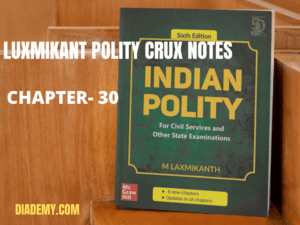
Governor[Part- IV]
| Governor | · Part IV – (153-167) Article.
· Chief executive head of the state – nominal head – like President |
| State Executive | State executive consists of the governor, the chief minister, the council of ministers and the advocate general. |
| Dual Role | · Constitutional head of the state.
· Representative of the Centre – President |
| 7thConstitutional Amendment 1956 | A governor for two or more state charge @ time.( dis. On the ratio of population)
Salary same regardless number positions held |
| Art. 155 | Appointment- by President on the advice of COM |
| Art. 157 | Qualification- Citizen of India, 35 year of age. |
| Art. 156 | Tenure– 5 year but with pleasure of POI – Can transfer from one state to another during term
Cannot be vacant (interregnum) hence; hold office till the new arrives. |
| Executive Power | · All executive action – name of gov.
· Make rules specifying manner for Order authentication · Rules for – convenient transaction of the business of a state government and for the allocation among the ministers · Appoints CM + Ministers – hold office during his pleasure. · Appoints – advocate general of a state, state election commissioner, chairman and members of the state public service commission. · Seek any information relating to the administration of the affairs of the state and proposals for legislation from CM. · Recommend – imposition of constitutional emergency in a state to the president. · Acts as the chancellor of universities in the state. |
| Legislative Powers | · Summon or prorogue SLA + dissolve SLA.
· Address SL at the commencement of the first session · Send messages to the house or houses for a bill · Appoint any member of SLA to preside over its proceedings when the offices of both the Speaker and the Deputy Speaker fall vacant. · Nominates 1/6thof SLC members – persons having special knowledge or practical experience in literature, science, art, cooperative movement and social service. · Nominate one member to the SLA from the Anglo-Indian Community. · Decides on the question of disqualification of members · Bill: (a) Give his assent to the bill, or (b) Withhold his assent to the bill, or (c) Return the bill (if it is not a money bill) for reconsideration of the state legislature. However, if the bill is passed again by the statelegislature with or without amendments, the governor has to give his assent to the bill, or (d) Reserve the bill for the consideration of the president. · Promulgate ordinances when the state legislature is not in session. · Lays the reports of the State Finance Commission, the State Public Service Commission and the Comptroller and Auditor- General – accounts of the state, before the state legislature. |
| Financial Powers | · Annual Financial Statement (state budget) – laid before the state legislature.
· Money bills can be introduced – prior recommendation. · No demand for a grant – except on his recommendation. · Make advances out of the Contingency Fund – unforeseen expenditure. · Constitutes a finance commission after every five years – review the financial position of the panchayats and the municipalities. |
| Judicial Powers | · Grant pardons, reprives, respites and remissions of punishment or suspend, remit and commute the sentence – any person convicted of any offence against any law
· Consulted by the president while appointing the judges of the concerned state high court. · Appointments, postings and promotions of the district judges – consultation with the state high court. · Appoints persons to the judicial service of the state – consultation with the state high court and the State Public Service Commission. |
| CONSTITUTIONAL POSITION OF GOVERNOR | · Governor Function
· Nominal Executive on aid and advise · Real Executive Council of Ministers (COM)+Chief Minister (CM) |
| Constitutional position difference from president | Constitutional position of the governor differs from that of the president in the following two respects:
· Governor can use his discretion at some instance more as compared to POI. · After 42nd CAA 1976, advice binding on the President, but no such provision has been made with respect to the governor. |
| Governor Constitutional Discretion | The governor has constitutional discretion in the following cases:
· Reservation of a bill for President. · Recommendation for Imposition of President’s Rule. · While exercising his functions in additional charge. |
Get all essential Crux notes by clicking here https://diademy.com/product/staticcrux/